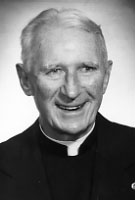
Father Robert E. Sheridan, MM
Born: October 17, 1900
Ordained: May 31, 1925
Died: August 4, 1987
Father Robert E. Sheridan, known to many as RES, died on August 4, 1987, at Phelps Memorial Hospital.
Father Sheridan was born in Chicago, Illinois on October 17, 1900. He applied to Maryknoll in 1920 while he was in second year Philosophy at St. Mary’s Seminary in Baltimore. In his autobiography he wrote: “Little of importance dotted the early period of my life, though when asked by my elders what I wanted to be in life, I would nivariably answer that I wanted to be either a priest or a teamster. The latter occupation entranced me because I had a great love for horses, a love that might allow me to fill both capacities when I shall get to the missions where the equestrian quadruped might do its share in facilitating the conversion of souls.” He was ordained on May 31, 1925 and assigned to Kongmoon.
Father Robert served in so many different capacities that a short book could be written to cover his vast missionary contribution. In 1929 he was assigned to the Philippines. He was recalled to the U.S. to undertake development work where he knew many priests and bishops resulting from his early diocesan studies. In 1940 he was sent again to Cebu as Local Superior.
He wrote of his experiences in these difficult years: “When war broke in Cebu I had just returned from preaching a retreat to public high school students. There is no special danger hereabouts, though sounds have a way of upsetting a fellow, and the bombers left a piece of shrapnel in my room as a souvenir. I’d not be here now if the chunk of scrap iron had smacked me. Between December, 1941 and March, 1942, four ships left Cebu for Australia, but we missioners felt it our job to stay in the Philippines; and we nourished the illusion that the enemy would not go into the mountains but be content to remain on the coast. One night at midnight Dr. Drum and I were aroused by machine-gun bullets bouncing about our house. A Filipino boy told us to follow him to a nearby cave. We priests each took a Mass kit and whatever personal belongings we could find in the dark.” In 1942 he was interned by the Japanese and released on February 4, 1945.
Life in these camps was difficult yet the missioners were able to continue their work whenever possible. He wrote: “We were put on work details for three hours a day – wood crew, garbage squad, garden company. Towards the end, five hours a day were spent in the garden and the compensation was 300 extra grams of food – which meant the difference between broken and fair health.”
In 1947 Father Bob was assigned to work as the Novice Master and Superior of the Brothers. He worked in the Brothers’ Formation Program until 1959 when he was appointed Econome at the Major Seminary. In 1965 he was assigned back to the Philippines. He was called back to do Development work in San Francisco and Chicago until his retirement in 1976. For Father Bob this meant using all his talents for the cause of Maryknoll and Mission. He was a communicator; he published a monthly in-house diary, the “Chi Rho Newsletter” sent to all members about the activities at the Center. He published also a newsletter “Tunc et Nunc”, containing news items of former Maryknollers. Among his other writings were those on the Founders, on Bishops Byrne and McGurkin and various other items on the early days of the Society. He was a living link between the present and those early days. In retreats he told many anecdotes about the Founders and other early members.
Father Sheridan was a community person. As long as he was at the Center he tried his best to make all visitors welcome. He personally directed an early get-together in the evenings before dinner which became known as “The Happy Hour”. A member of the organizing committee for Maryknoll’s 75th Anniversary, he worked tirelessly, always volunteering for any task, even menial, to ensure that the event was a success. He never wanted recognition.
After his retirement, Father Bob became the “Good Will Visitator” of Maryknollers, former members and benefactors in the U.S. He travelled much, promoting the cause of Mission in all his words and works. He was also encouraged to work with others on a definitive history of Maryknoll. His humble response to this was: “Though I am available to help in any way, I have no training in the philosophy of history and, at 85, no long life expectancy.” He went to work on it immediately. He was also asked to write about himself. He did so in a small booklet called “Brief Memoirs of a Maryknoller.” He terminates with thse words: “Presently involved in the Society’s — China History Project, I am working on some letters of Arther Lebbe. He had various other projects on the drawing board and wrote: “St. Robert, the Cistercian, is my patron saint. In a letter to another Cistercian saint He concluded: ‘Keep smiling’ So, on this note, too, my memories had better conclude.” He did bring smiles to many during his years of service and dedication to the Lord.
Wake Service was conducted by Fr. Joseph Picardi on August 5; the biography being read by Bro. Matthew Kirwan. Father Raymond Nobiletti was Principal Concelebrant at the Mass on the following day; Fr. Raymond Hill gave the Homily and Fr. Norbert Rans conducted graveside ceremony.
